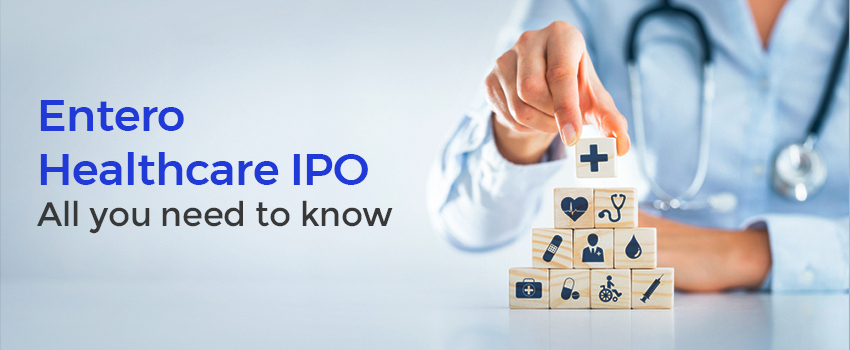Entero Healthcare Solutions IPO Details:
Company Name: Entero Healthcare Solutions
Offering: 1,31,45,079 equity shares of face value Rs 10 each
Price Band: Rs 1195-1258 per equity share
Issue Dates: February 9, 2024, to February 13, 2024
Allocation:
- QIBs: Not more than 75% (including 5% to mutual funds)
- Non-Institutional Bidders: Not less than 15%
- Retail Investors: Remaining 10%
Listing: BSE and NSE
Book Running Lead Managers: ICICI Securities, DAM Capital Advisors, Jefferies India, JM Financial, and SBI Capital Markets
Compliance Officer: Jayant Prakash
Entero Healthcare Solutions is coming out with a 100% book-building; initial public offering (IPO) of 1,31,45,079 shares of Rs 10 each in a price band of Rs 1195-1258 per equity share. Not more than 75% of the issue will be allocated to Qualified Institutional Buyers (QIBs), including 5% to the mutual funds. Further, not less than 15% of the issue will be available for the non-institutional bidders and the remaining 10% for the retail investors.
The issue will open for subscription on February 9, 2024 and will close on February 13, 2024. The shares will be listed on BSE as well as NSE. The face value of the share is Rs 10 and is priced 119.50 times of its face value on the lower side and 125.80 times on the higher side.
Book running lead managers to the issue are ICICI Securities, DAM Capital Advisors, Jefferies India, JM Financial and SBI Capital Markets. Compliance Officer for the issue is Jayant Prakash.
Profile of the company
Entero Healthcare Solutions is amongst the top three healthcare product distributors in India in terms of revenue in Financial Year 2022 and reported an operating income of Rs 25,220.65 million in the Financial Year 2022. Further, it also achieved the fastest scale-up of operations among healthcare products distributors in India (between Financial Year 2019 to Financial Year 2022), and reached Rs 25,000 million of operating income within four years of operations.
The company was founded in 2018 by Prabhat Agrawal, its Promoter, Managing Director and Chief Executive Officer, and Prem Sethi, its Promoter, Whole-time Director and Chief Operating Officer, with the vision to create an organized, Pan-India, technology-driven and integrated healthcare products distribution platform that can add value to the entire healthcare ecosystem. The company adds value to the healthcare product manufacturers that work with it by providing them reach and accessibility to pharmacies, hospitals and clinics through its integrated and technology-driven, Pan-India healthcare products distribution platform. As of March 31, 2023, its 73 warehouses located across the country, last-mile delivery infrastructure and relationships with pharmacies, hospitals and clinics enable healthcare product manufacturers to make their products available to a wide range of customers.
Similarly, the pharmacies, hospitals and clinics that it services get access to a wide range of healthcare products through its distribution infrastructure and its healthcare product manufacturer relationships. During the Financial Years 2021, 2022 and 2023, it catered to over 39,500, 64,200 and 81,400 retail customers, respectively, and over 1,600, 2,500 and 3,400 hospital customers, respectively. Further, as of March 31, 2023, the company has supply relationships with over 1,900 healthcare product manufacturers that gives it access to over 64,500 product stock-keeping units (SKUs).
Proceeds are being used for:
- Repayment/prepayment, in full or part, of certain borrowings availed of by the company.
- Funding the long-term working capital requirements.
- Pursuing inorganic growth initiatives through acquisitions.
- General corporate purposes.
- Industry Overview
India’s fast-growing healthcare industry has become one of the leading contributors to the economy. A confluence of economic and demographic factors is driving healthcare demand in the country. Factors such as an ageing population, a growing middle class, an increasing number of lifestyle diseases, and adoption of technology are the key drivers of the healthcare industry in India.
The domestic healthcare industry comprises the following segments: healthcare delivery (hospital), pharmaceuticals, health insurance, medical devices, diagnostic services, medical equipment, and other support services to healthcare players. The overall healthcare market is the ecosystem of all the mentioned sub-segments wherein the service provider interacts with the end consumer through connected means.
The Indian healthcare industry, consisting of the pharmaceuticals, hospitals, medical devices, diagnostics and health insurance segments, grew exponentially, logging a 10-11% CAGR, between fiscals 2017 and 2023. Last fiscal, the industry was valued at Rs 9.9 trillion. With an ageing population, an increased incidence of lifestyle diseases, greater healthcare awareness, technology adoption, and a growing affluent middle class serving as some of the key drivers, the market is expected to clock an 11-12% CAGR between fiscals 2023 and 2028, reaching Rs 16.5-17.5 trillion in fiscal 2028.
The Indian pharmaceutical industry is the world’s third-largest by volume and was valued at? 3.6-3.8 trillion (including bulk drugs and formulation exports) as of last fiscal. The industry can be broadly classified into formulations and bulk drugs. Formulations can further be divided into domestic formulations and export formulations, both having almost an equal share in the market.
At present, low-value generic drugs constitute a large part of Indian exports. India accounts for 3.5% of total drugs and medicines exported globally, and exports pharmaceuticals to more than 200 countries and territories, including highly regulated markets such as the US, the UK, the European Union and Canada. India has a complete ecosystem for the development and manufacturing of pharmaceuticals, with companies having state-of-the-art facilities and skilled/ technical manpower. Moreover, the country has several renowned pharmaceutical educational and research institutes and a robust ecosystem of allied industries.
Currently, there are more than 900,000 retail pharmacies in India and the majority of them have been local/standalone retail pharmacy outlets. However, with increased digitalization and better healthcare awareness, modern pharmacy chains and e-pharmacies have started to establish a significant presence in urban and semi-urban areas.
Currently, large/national retail chains and e-pharmacies comprise only 8-10% of the retail pharmacy market, and most of them are concentrated in Tier-1 cities, such as Mumbai, Delhi and Bengaluru. Tier-2 cities and beyond are still underpenetrated in terms of large retail pharmacies.
Pharmaceutical distributors and retailers are key stakeholders in the pharmaceutical supply chain. Pharmaceutical distributors act as an intermediary to pharmacy retailers and pharmaceutical manufacturers. They enter into contracts with pharmaceutical distributors to supply their products to the retailers and hence to the end-consumers. Every pharmaceutical company has a defined number of distributors for each geography or locality that supplies products to pharmacy retailers in that particular area.
Pros and Strengths
It operates in the large and highly fragmented Indian healthcare products distribution market: The target addressable market for pharmaceutical distributors in India is valued at Rs 2.7 trillion in the Financial Year 2023 and is expected to grow at 10% to 11% CAGR from the Financial Year 2023 to the Financial Year 2028. The distribution of pharmaceutical products in India is extremely fragmented with approximately 65,000 distributors, as of March 31, 2023, that generally service limited local areas only, unlike developed markets where large nationwide distributors occupy a dominant market position.
The Indian pharmaceutical distribution market remains very fragmented with traditional local distributors having a market share of 90% to 92%, with large/national distributors having a market share of 8% to 10%.
It is one of India’s largest and fastest growing healthcare products distribution platforms: Having commenced its business in 2018, it is amongst the top three healthcare products distributors in India in terms of revenue in the Financial Year 2022 and reported an operating income of Rs 25,220.65 million in Financial Year 2022. Further, it also achieved the fastest scale-up of operations among healthcare products distributors in India (between Financial Year 2019 to Financial Year 2022), and reached Rs 25,000 million of operating income within four years of operations.
During the Financial Years 2021, 2022 and 2023, its retail customers amounted to over 39,500, 64,200, and 81,400, respectively, and its hospital customers amounted to over 1,600, 2,500, and 3,400, respectively.
Track record of inorganic expansion and integration to grow its geographic reach, revenues and scale: The company has endeavored to take advantage of the market consolidation opportunities available in the Indian healthcare products distribution market. Accordingly, it has adopted a Pan-India approach towards acquiring and integrating smaller distributors to expand its geographic reach and increase the wallet share of its customers.
Since the inception of the company in the Financial Year 2018, it has acquired 32 entities in the healthcare products distribution industry. It has an on-ground acquisition team to identify acquisition opportunities in the markets for entry or expansion. Subsequent to the completion of an acquisition, it deploys its growth strategies such as product portfolio expansion, increased customer reach, improved service levels, technology-based solutions to increase its market share.
Proprietary technology platform with integrated business intelligence tools and solutions: To grow its operations and bring efficiencies in the healthcare products distribution ecosystem, it has adopted a technology-focused approach which is anchored on its proprietary integrated technology platforms and business intelligence tools and solutions.
Significant inefficiencies and redundancies, including during product ordering, sales, payments, product returns, claims and reconciliations and inventory management, can be improved by digitizing supply chain processes which would benefit the entire healthcare ecosystem. To further this strength, it has made continuous investments towards enhancing its technology platform. For example, the company invests in technology at all of its distribution warehouses to enhance fulfilment rates, reliability and product availability. For the Financial Years 2021, 2022 and 2023, its investments towards enhancing its technology platform amounted to Rs 64.52 million, Rs 107.64 million and Rs 95.96 million, respectively.
Risks and Concerns
1. Exposed to inventory risk:
The company needs to ensure optimal inventory levels and are exposed to inventory risk as a result of rapid changes in product life cycles, changing consumer preferences, the uncertainty of product developments and launches, manufacturer back orders and other related problems as well as the general economic environment in India. There can be no assurance that it can accurately predict these trends and events and avoid over-stocking or under-stocking of products.
Furthermore, it places orders for products based on demand forecast which could change significantly between the time when the products are ordered and the time when they are ready for delivery. If the company underestimates customer demand or if its suppliers fails to provide products to it or deliver products to its customers in a timely manner, it may experience inventory shortages, which may, in turn, result in unfulfilled customer orders, leading to an adverse effect on its customer relationships. While it has not faced any such instances in the past, its failure to maintain proper inventory levels for its business may have an adverse effect on its business, financial condition, results of operations and prospects.
2. May face challenges in managing growth:
The company commenced its business in January 2018 and has witnessed a growth in revenue from operations at a CAGR of 36.17% from the Financial Year 2021 to the Financial Year 2023. It provides distribution services for healthcare products to retail pharmacies, hospitals and healthcare clinics in India.
The company’s efforts to efficiently operate, maintain and expand its distribution infrastructure may be unsuccessful. Its ability to efficiently operate its distribution infrastructure relies on coordination amongst various stakeholders within its network, including, among others, its suppliers, transportation providers and its employees. If it fails to maintain coordination amongst various stakeholders in a synergistic manner, its business, financial condition and results of operations may be adversely affected.
Further, if it expands its distribution infrastructure too rapidly, it may encounter financial difficulties if the demand for its services falls short of its increased capacities. On the other hand, if it fails to expand its infrastructure and geographic reach at the necessary pace, it may lose potential customers and market share, or a portion of its existing customers’ business to its competitors.
3. No long-term agreement with customers:
The company does not have long-term agreements with its customers. As a result, its customers can terminate their relationships with it without notice, which could adversely impact its business. Consequently, its revenue may be subject to variability because of fluctuations in demand. Its customers have no obligation to place an order with it and may either cancel, reduce or delay orders. The orders placed by its customers are dependent on factors such as pricing, customer satisfaction, fluctuation in demand and customers’ inventory management, amongst others. Although, it has a strong emphasis on quality, timely delivery of its products and personal interaction with the customers, any change in the buying pattern of customers can adversely affect the business of the company.
4. Private label business may not be successful:
The company’s private label business involves a large number of risks, including, difficulties it may face in attracting and retaining customers as they may be unfamiliar with its brands. Similarly, its relationships with its retail pharmacies/customers might be hindered due to the competition from their own private label products. Moreover, the company faces significant competition from other private-label brands. Further, as its generic medicine business is not expected to contribute significantly to its financial results going forward, the EBITDA of the Curever business for the respective years has been adjusted for the purposes of calculating its Adjusted EBITDA.
Further, consolidation of retail pharmacies with third-party players, expansion of large retail pharmacy networks, reductions in reimbursement rates, shifts in the mix of branded and generic pharmaceutical sales, and exclusion from preferred pharmacy networks could also impair the sales of its private label products, and hinder its profitability.
A failure to maintain profitable operations from its private label business may result in significant costs, including those associated with closures of its operations and a reduction in its workforce. If its private label operations fail to achieve, or are unable to sustain, acceptable net sales and profitability levels, it might have an adverse impact on its business, financial position or results of operations.
Outlook
- Plans to supplement organic growth with strategic acquisitions
- Focus on expanding product adjacencies and market presence
Overall, Entero Healthcare Solutions presents opportunities for investors in India’s growing healthcare industry, although there are risks associated with its rapid growth and operational challenges. Investors should carefully evaluate the IPO prospectus and consider the company’s strengths, weaknesses, opportunities, and threats before making investment decisions.
Recommendation: AVOID
| IPO Activity | Date |
| IPO Open Date | February 09, 2024 |
| IPO Close Date | February 13, 2024 |
| Basis of Allotment Date | February 14, 2024 |
| Refunds Initiation | February 15, 2024 |
| A credit of Shares to Demat Account | February 15, 2024 |
| IPO Listing Date | February 16, 2024 |
| Application | Lots | Shares | Amount |
|---|---|---|---|
| Minimum | 1 | 11 | ₹ 13,838 |
| Maximum | 14 | 154 | ₹ 193,732 |
When will the Entero Healthcare Solutions Ltd IPO open?
Entero Healthcare Solutions IPO will open for subscription on Friday, 09th February 2024, and closes on Tuesday 13th February 2024.
What is the price band of Entero Healthcare Solutions Ltd IPO?
The price band for Entero Healthcare Solutions Ltd IPO is Rs. 1195-1258/share.
What is the lot size for the Entero Healthcare Solutions Ltd IPO?
Retail investors can subscribe to the IPO minimum lot size is 11 shares, up to a maximum of 14 lots i.e. Rs. 1,93,1732/-.
What is the issue size of Entero Healthcare Solutions Ltd IPO?
The total issue size is ~ Rs. 1,600Cr.
When will the basis of allotment be out?
Allotment will be finalized on February 14th and refunds will be initiated by February 15th. Shares allotment will be credited in Demat accounts by February 15th.
What is the listing date of Entero Healthcare Solutions Ltd’s IPO?
The tentative listing date of the Entero Healthcare Solutions IPO is February 16th, 2024.
What if I do not get the allotment?
If you do not get an allotment of this IPO we recommend you to check out our MoneyWorks4me Core Superstars which helps you build a strong portfolio right away. It offers a Model Portfolio of high-quality stocks Buy/Sell alerts on Quality stocks at a reasonable price and SIP recommendations on stocks. With the help of MoneyWorks4me Core Superstars, you would have picked winners like Asian Paints, Divis Labs, Titan, Pidilite, Cipla, Bharti Airtel, and ICICI Bank.
Recent IPO’s:
Best Stocks From:
Top 10 Stocks in India Best EV Stocks in India Screener Alpha Cases Best 5G Stocks in India Top AI Stocks in India Best Drone Stocks in India Best Defence Stocks in India Top 10 Infrastructure Stocks in India Best Fintech Stocks in India Best Manufacturing Stocks in India Best Liquor Stocks in India
Need help on Investing? And more….Puchho Befikar
Why MoneyWorks4me | Call: 020 6725 8333 | Ebook | WhatsApp: 9860359463
*Investments in the securities market are subject to market risks. Read all the related documents carefully before investing.
*Disclaimer: The securities quoted are for illustration only and are not recommendatory











